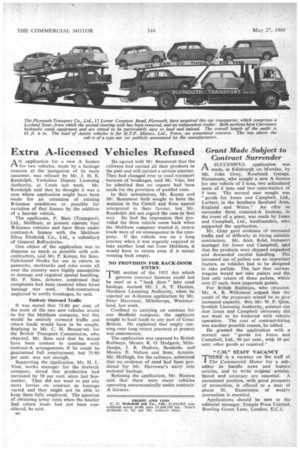Extra A-licensed Vehicles Refused
Page 40

If you've noticed an error in this article please click here to report it so we can fix it.
AN application for a new A licence for two vehicles, made by a haulage concern at the instigation of its main customer, was refused by Mr. 1. H. E. Randolph, Yorkshire Deputy Licensing Authority, at Leeds last week. Mr. Randolph said that he thought it was a case where application might have been made for an extension of existing B-licence conditions or possibly for variation of that licence by the addition of a heavier vehicle.
The applicants, F. Sims (Transport), Ltd., Meltham, at present operate four B-licence vehicles and have three under contract-A licence with the Meltham Silica Firebrick Co., Ltd., a subsidiary of General Refractories.
One object of the application was to dispense as much as possible with subcontractors, said Mr. P. Kenny, for Sims. Fabricated blocks for use in retorts in gasworks, steelworks and coke ovens all over the country were highly susceptible to damage and required special handling. Mr. F. Sims, director, confirmed that complaints had been received when hired haulage was used. Sub-contractors neglected-to notify breakages, he said.
Entirely Outward Traffic It was stated that 75-80 per cent. of the work of the two new vehicles would be for the Meitham company, but this would be entirely outward traffic and return loads would have to be sought. Replying to Mr. C. H. Beaummt, for the British Transport Commission, who objected, Mr. Sims said that he would have been content to continue with • contract-A arrangements if he could be guaranteed full employment, but 75-80 per cent, was not enough.
Supporting the application, Mr. H. L. Vine, works manager for the firebrick company, stated that production had increased by 50 per cent, since last September. They did not want to put any more lorries on contract as tonnage varied and they might not be able to keep them fully employed. The question of obtaining lower rates when the haulier had return loads had not been considered, he said.
116 He agreed with Mr. Beaumont that the railways had carried all their products in the past and still carried a certain amount. They had changed over to road transport because of breakages, said Mr. Vine, but he admitted that no request had been made for the provision of padded vans.
In their submissions, Mr. Kenny and Mr. Beaumont both sought to have the decision in the Cattell and Sons appeal interpreted in their favour, but Mr. Randolph did not regard the case in that way. He had the impression that provided the Sims vehicle came back when the Meltham company wanted it, return loads were of no consequence to the company. If the vehicle was on a long journey when it was urgently required to take another load out from Meltham, it would have to return even if it meant running back empty.
NO PROVISION FOR BACK-DOOR ENTRY.
THE section of the 1933 Act which governs contract licences could not be used as a "back door" into road haulage, warned Mr. I, A. T. Hanlon, Northern Licensing Authority, when he rejected an A-licence application by Mr. Peter Harrower, Milnthorpe, Westmorland, last week.
Confined to carrying on contract for one Sheffield company, the applicant sought to haul loads to any part of Great Britain. He explained that empty running over long return journeys at present was uneconomic.
The application was opposed by 13-ritish Railways, Messrs. R. 0. Hodgson, Milnthorpe, I. B. Hudson, Sandside, and Messrs. E. Nelson and Sons, Arnside. Mr. McHugh, for the railways, submitted that no evidence of need had been produced for Mr. Harrower's entry into national haulage.
Refusing the application, Mr. Hanlon said that there were many vehicles operating uneconomically under contractA licences.
















































































































